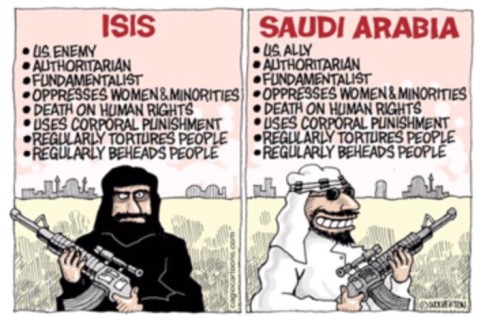– Saudi Arabia “Ready To Send Ground Troops To Syria”:
Last month, when Saudi Arabia announced it would be heading (that’s heading, not beheading) a 34-nation “anti-terror coalition”, everyone who knows anything at all about the Mid-East and about the sectarian divide laughed hysterically.
Why? Because Saudi Arabia is without question the world’s number one state sponsor of terror. Riyadh would vehemently deny that charge but when your state religion is Wahhabism it’s a bit difficult to explain how it is that you’re not contributing to the rise of groups like al-Qaeda and ISIS.
Fortunately for the Saudis, they’ve got all the oil, which means the world looks the other way while the government racks up an abysmal human rights record and sticks to policies that look like they walked right out of the seventh century.
Here’s an excerpt from “Saudi Arabia: An ISIS That Has Made It,” by Kamel Daoud:
Black Daesh, white Daesh. The former slits throats, kills, stones, cuts off hands, destroys humanity’s common heritage and despises archaeology, women and non-Muslims. The latter is better dressed and neater but does the same things. The Islamic State; Saudi Arabia. In its struggle against terrorism, the West wages war on one, but shakes hands with the other. This is a mechanism of denial, and denial has a price: preserving the famous strategic alliance with Saudi Arabia at the risk of forgetting that the kingdom also relies on an alliance with a religious clergy that produces, legitimizes, spreads, preaches and defends Wahhabism, the ultra-puritanical form of Islam that Daesh feeds on.
And so, when the Saudis announced they were set to launch their own “war” on terror, we couldn’t help but chuckle at the sheer absurdity. “That’s right ladies and gentlemen, you no longer have anything to fear from Sunni extremists because the undisputed king of promoting Sunni extremism is on the case,” we quipped, incredulous.
We went on to ask the following obvious question: “Is this the precursor to Saudi, Qatari, UAE, and (more) Turkish boots on the ground in Syria and Iraq, just as Iraqi Shiite politician Hanan Fatlawi predicted?
“It certainly appears so,” we added.
Well not to put too fine a point on it, but we were exactly right, because just moments ago, a Saudi military spokesman told AP the kingdom is ready to send ground troops to Syria to fight Islamic State group if coalition leaders agree.
At this juncture, it’s difficult to find the words to express the sheer absurdity of what’s going on here. It’s one thing for the US to send in SpecOps to fight groups the CIA may have one time armed, but this is Saudi Arabia preparing to send in ground troops to fight groups the country, along with Turkey, is still arming.
We’re not saying the Saudis are openly delivering weapons to ISIS in crates with Riyadh’s return address stamped in the upper left hand corner of the lid, but the Saudis and Qatar are unquestionably aiding Sunni extremist elements in Syria and some of those very same Sunni extremists are, for lack of a better word, terrorists. The Saudis might as well just meet the militants ahead of time, hand them weapons, and then agree to meet back in an hour to fight.
If Riyadh sends in ground troops to Syria it will mean that Saudi forces will be fighting in the same country as Iranian forces and that, ladies and gentlemen, is bad news.
And if you thought the fact that the kingdom’s budget is bleeding red ink was going to stop Riyadh from waging war, you’d be wrong:
- SAUDIS WON’T LET OIL CRASH DETER REGIONAL PLANS, MINISTER SAYS
We wonder if it’s a coincidence that this comes just as Assad, Russia, and Iran encircle Aleppo, cutting off the opposition from their Sunni benefactor in Turkey. As we said earlier today with regard to the peace talks in Geneva, “the urgency expressed by the US, Saudi Arabia, and Turkey shouldn’t be mistaken for some kind of benevolent regard for the lives that are lost each and every day the war drags on. Rather, Washington, Riyadh, and Ankara know that if Aleppo falls, that’s it for the “moderate” opposition.” And that means Iran retains its ally in Damascus and thus its supply line to Hezbollah.
We’ll close by simply reminding you of the question we asked in December: “Did Saudi Arabia just clear the way for an invasion of Syria?“
